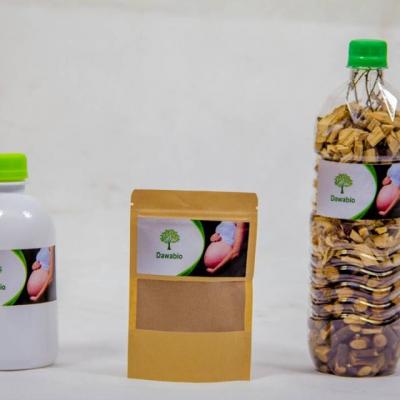Using fertility medications can help increase your chances of ovulating outdoors, but this should always be based on the doctor's advice. Although it is still possible to get pregnant, you also run the risk of having an ectopic pregnancy. During this time, if the blockage occurs in all of the fallopian tubes, it is unlikely or even completely impossible to get pregnant without taking special precautions. This will make it harder for the fertilized egg to travel to the uterus because of a blockage.
Doctors usually offer In Vitro Fertilization as an alternative. Fortunately, thanks to plants, we present to you a completely natural and very effective treatment to unblock the fallopian tubes in two months.
Herbal treatment to unclog the fallopian tubes

Here we offer you a mixture of African roots and plants that are excellent for unblocking your fallopian tubes. It is very effective in unblocking your fallopian tubes and getting pregnant and is made up of two components: an oil to apply as a poultice and herbal teas. This is the secret to unblocking your proboscis naturally through plants. By its vasodilator, purifying and diuretic power, the herbal tea will have the action of unclogging your tubes.
Our natural remedy allows the transport of gametes (spermatozoa and oocytes). Also, the oil to be applied as a poultice will soften the tissues and improve circulation throughout the pelvic region. So, the combined action of these two elements will allow you to unblock your tubes naturally and get pregnant.
For more information on the treatment, click on the image above or contact us on +229 99 54 64 63 (also available on the WhatsApp mobile application)
Causes and symptoms of blocked tubes
Blocked fallopian tubes rarely cause symptoms. However, in some women, this condition can cause lower abdominal pain and abnormal vaginal discharge. Blockage or damage to the fallopian tubes can be caused by several conditions, including:
- Endometriosis
- Pelvic inflammatory disease
- Sexually transmitted disease
- The appendix burst
- Miscarriage
- Ethopic Pregnancy
- Have had surgery on organs in the abdominal or pelvic cavity (including the fallopian tubes)
- Use of an intrauterine device (IUD) or coil
Because it can be caused by many conditions and diseases, a blocked fallopian tube should be examined by a doctor. To determine if the fallopian tube is completely blocked, the doctor will perform an ultrasound, hysterosalpingogram (HSG), or endoscopic examination of the fallopian tubes (hysteroscopy).
Once the cause is identified, the doctor will provide treatment based on the cause of the fallopian tube disruption being experienced. If necessary, the obstruction of the fallopian tube will probably need to be treated surgically.
Discovering laparoscopy
Laparoscopy of the fallopian tubes - what is the procedure for?
Laparoscopy is used in the treatment of many internal diseases. It is used to heal the liver, abdominal cavity, and spleen. Laparoscopy has also found its application in gynecology. In this area of medicine, it is used to treat obstruction of the fallopian tubes and endometriosis, and to remove adhesions, polyps and tumors.
In addition, laparoscopy can also have diagnostic application. Through the procedure, the doctor can assess the condition and structure of the sexual organs, as well as examine an ectopic pregnancy. Gynecological laparoscopy is an invasive method of treating infertility.
Gynecological laparoscopy - indications
One of the most common indications for laparoscopy is infertility (infertility). Laparoscopy allows the evaluation of the structure and position of the pelvic organs, the evaluation of the patency of the fallopian tubes, the localization of adhesions and the diagnosis of endometriosis. Currently, most gynecological operations are performed according to the principles of minimal invasiveness. The most common methods for this are the laparoscopic method or the transvaginal route.
Contraindications for laparoscopy
Laparoscopy is a very safe procedure, but there are contraindications for which it should not be performed in some people. Belong to them:
- circulatory and respiratory failure,
- chronic bronchitis,
- advanced asthma
- past heart attack,
- pregnancy.
Gynecological laparoscopy - complications
Complications of laparoscopy are very rare. The most common complications include:
- anesthetic complications related to anesthesia,
- tissue damage associated with the introduction of operational tools into the abdominal cavity,
- postoperative bleeding,
- abdominal hernias around the trocar punctures,
- postoperative bleeding,
- abdominal hernias,
- pain in the incision area and in the abdominal cavity.
It should be noted that if the health problem turns out to be more serious than what the doctor thought, laparoscopy may be an indication for full surgery.
3 natural plants to unclog the tubes
Ginger root increases circulation, thereby reducing inflammation and blockage. Hawthorn and Uva Ursi help reduce congestion and excess body fluids, thereby clearing the obstruction of the fallopian tubes caused by collecting fluid or blood.
Dong Quai, a Chinese herbal medicine, helps reduce spasms in the fallopian tubes.
Use castor oil. It is believed that the use of castor oil helps heal blocked fallopian tubes by increasing blood and lymph flow to the fallopian area. The increased blood supply helps the function of the fallopian tubes and clears blockages in the fallopian tubes, while the lymphatics help to clear old cells, scar tissue, and damaged cells.
You can apply castor oil directly to the lower abdomen or you can also use castor oil and wipes available in online and herbal stores. You need to do this every day for at least 1-2 months for good results.
